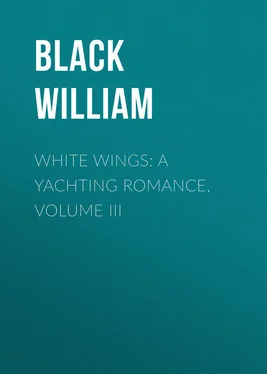William Black - White Wings - A Yachting Romance, Volume III
Здесь есть возможность читать онлайн «William Black - White Wings - A Yachting Romance, Volume III» — ознакомительный отрывок электронной книги совершенно бесплатно, а после прочтения отрывка купить полную версию. В некоторых случаях можно слушать аудио, скачать через торрент в формате fb2 и присутствует краткое содержание. Жанр: foreign_antique, foreign_prose, на английском языке. Описание произведения, (предисловие) а так же отзывы посетителей доступны на портале библиотеки ЛибКат.
- Название:White Wings: A Yachting Romance, Volume III
- Автор:
- Жанр:
- Год:неизвестен
- ISBN:нет данных
- Рейтинг книги:4 / 5. Голосов: 1
-
Избранное:Добавить в избранное
- Отзывы:
-
Ваша оценка:
- 80
- 1
- 2
- 3
- 4
- 5
White Wings: A Yachting Romance, Volume III: краткое содержание, описание и аннотация
Предлагаем к чтению аннотацию, описание, краткое содержание или предисловие (зависит от того, что написал сам автор книги «White Wings: A Yachting Romance, Volume III»). Если вы не нашли необходимую информацию о книге — напишите в комментариях, мы постараемся отыскать её.
White Wings: A Yachting Romance, Volume III — читать онлайн ознакомительный отрывок
Ниже представлен текст книги, разбитый по страницам. Система сохранения места последней прочитанной страницы, позволяет с удобством читать онлайн бесплатно книгу «White Wings: A Yachting Romance, Volume III», без необходимости каждый раз заново искать на чём Вы остановились. Поставьте закладку, и сможете в любой момент перейти на страницу, на которой закончили чтение.
Интервал:
Закладка:
But in the middle of the night, in the ladies' cabin, a sound of stifled sobbing. And the other woman goes over to the berth of her companion, and bends her head down, and whispers —
"Mary, why are you crying? Tell me!"
She cannot speak for a time; her whole frame is shaken with the bitter-sobs. And then she says, in a low, trembling, broken voice —
"He has not forgiven me. I saw it in his face."
CHAPTER IV.
TO ABSENT FRIENDS!
Next morning, however, every one perceived an extraordinary change in the appearance and manner of the girl. Mary Avon had come back to us again, with all the light and life of her face, and the contented gentleness of the soft black eyes. What had wrought the transformation? Certain confidential assurances in the silence of the night that Angus Sutherland, so far from not forgiving her, had insisted that she was not to blame at all. Or the natural reaction after a long strain of anxiety? Or merely the welcome fresh breeze of the morning, with the cheerful, wooded shores, and the white houses shining in the sunlight? Any how there was quite a new expression in her face; and we heard the low, sweet laugh again. It is true that, once or twice, as she walked up and down the deck with the Laird, her eyes grew pensive as she looked away along the hills on the southern shores of the loch. That was the direction in which Angus had left in the morning. And these hills were somewhat overcast; it seemed to be raining inland.
Moreover, there was something else to make our breakfast party a glad one. The two men who had rowed our young Doctor across the loch at break of day had had the curiosity to pierce inland as far as the village of Clachan; and the scouts had brought back the most glowing accounts of the Promised Land which they had discovered. They had penetrated a fertile and deeply-wooded valley; and they had at length come upon a centre of the highest civilisation. There was a post-office. There was a telegraph-office. There was a church, the clock of which struck the hours.
"Just fancy that!" exclaimed our hostess. "A clock that strikes the hours! – and a telegraph-office! We might send a telegram to ask whether the country has been invaded anywhere, or whether the Prime Minister has committed suicide."
"I would like to hear about the steam fire-engine," said the Laird almost to himself.
"However, breeze or no breeze, seals or no seals," she says, with decision, "we must stay over a day here, to have the yacht thoroughly provisioned. We cannot go on skating on the edge of tinned meats. We must have a plentiful supply of fresh vegetables, and fresh milk, and eggs and butter; and then two or three joints are always so serviceable – cold, I mean, for luncheon; and if Fred cannot get any game, at least he must get us some fowls. What do you say, Mary? Shall we walk over to this place, and clear the way for Fred?"
"Oh, no!" says the other, lightly; "you and I are going with the seal shooters. They never get near anything; so we cannot be in the way. I assure you, sir, we shall be as quiet as mice," she adds, addressing the Laird.
"Ye will come with us, and ye will speak just as much as ye please," said the Laird, dogmatically. "What signifies a seal? The crayture is good for nothing! And the idea of you two going away by yourselves into the country! No – no; come away and get ready, Howard. If ye cannot shoot a seal with the two leddies in the boat, ye will never do it without. And the sea breezes, Miss Mary," he added, with an approving air, "are better for ye than the land breezes. Oh, aye; ye are looking just fine this morning."
A short time thereafter he was on deck, looking around him at the pleasant trees and the blue waters, when Miss Avon joined him, fully equipped for the expedition; and just at this moment they began to hear a sound of music in the stillness of the morning air. And then they perceived a rude old rowing-boat, pulled by a small boy of twelve or so, coming nearer and nearer; while another small boy of about the same age was peacefully reclining in the stern, his head thrown back so that it met the full glare of the morning sun, while he played vigorously but rather inaccurately "The Campbells are coming" on a tin whistle.
"Look at that!" said the Laird with delight; "is not that perfect happiness? Look at his pride and laziness – having another boy to pull him about, while he shows off on the penny whistle. Dear me, I wish I was that young rascal!"
"He seems happy enough," she said, with a sigh.
"That is because he does not know it," remarked the Laird, profoundly. "If you proved to him that he was happy, it would immediately vanish."
"You cannot be consciously happy; but you may be consciously unhappy – that is rather hard," said she, absently.
However, these two philosophers were withdrawn from this occult point by a summons from the Youth, who had already got the rifles and cartridges into the bow of the gig. And, indeed, as we rowed away from the yacht, in the direction of the rocks at the mouth of the loch, Miss Avon seemed determined to prove that, consciously or unconsciously, she was happy enough. She would not even allow that Angus Sutherland could have felt any pang of regret at leaving the White Dove and his friends.
"Poor chap!" said the Laird, with some compassion, as he turned his head and looked away towards those gloomy hills; "it must have been a lonesome journey for him this morning. And he so fond of sailing too; I'm thinking when he saw what a nice breeze there was, he was rather sorry to go away. I should not wonder if it was wi' a heavy heart that he went on board the steamer."
"Oh, no, sir! why should you think that?" said Mary Avon, quickly and anxiously. "If Dr. Sutherland had nothing to consider but yachting, he might have been sorry to go away. But think what lies before him; think what calls him! Look at the position he has won for himself already, and what is expected of him! and you would have him throw away his splendid opportunities in yachting? There is not a University in Europe where he is not known; there is not a man of science in Europe who does not expect great things of him; and – and – how proud his father must be of him!"
She spoke eagerly and almost breathlessly; there was a pink flush in her cheek, but it was not from shamefacedness. She seemed desperately anxious to convince the Laird that our Doctor ought to have left the yacht, and must have left the yacht, and could not do anything else but leave the yacht. Meanwhile, her friend and hostess regarded her curiously.
"A man with such capacities as he has," continued the girl, warmly, "with such a great future before him, owes it to himself that he should not give way to mere sentiment. The world could not get on at all if people – I mean if the great people, from whom we expect much – were always to be consulting their feelings. Perhaps he was sorry to leave the yacht. He does like sailing; and – and I think he liked to be among friends. But what is that when he knows there is work in the world for him to do? If he was sorry at leaving the yacht, you may depend on it that that had passed away before he stepped on board the steamer. For what was that trifling sentiment compared with the consciousness that he had acted rightly?"
Something about the precision of these phrases – for the girl but rarely gave way to such a fit of earnest talking – seemed to suggest to the silent person who was watching her, that this was not the first time the girl had thought of these things.
"Idle people," said this youthful controversialist, "can afford to indulge in sentiment; but not those who have to do great things in the world. And it is not as if – Dr. Sutherland" – she always faltered the least bit just before pronouncing the name – "were only working for his own fame or his own wealth. It is for the good of mankind that he is working; and if he has to make this or that sacrifice, he knows that he is doing right. What other reward does a man need to have?"
Читать дальшеИнтервал:
Закладка:
Похожие книги на «White Wings: A Yachting Romance, Volume III»
Представляем Вашему вниманию похожие книги на «White Wings: A Yachting Romance, Volume III» списком для выбора. Мы отобрали схожую по названию и смыслу литературу в надежде предоставить читателям больше вариантов отыскать новые, интересные, ещё непрочитанные произведения.
Обсуждение, отзывы о книге «White Wings: A Yachting Romance, Volume III» и просто собственные мнения читателей. Оставьте ваши комментарии, напишите, что Вы думаете о произведении, его смысле или главных героях. Укажите что конкретно понравилось, а что нет, и почему Вы так считаете.












